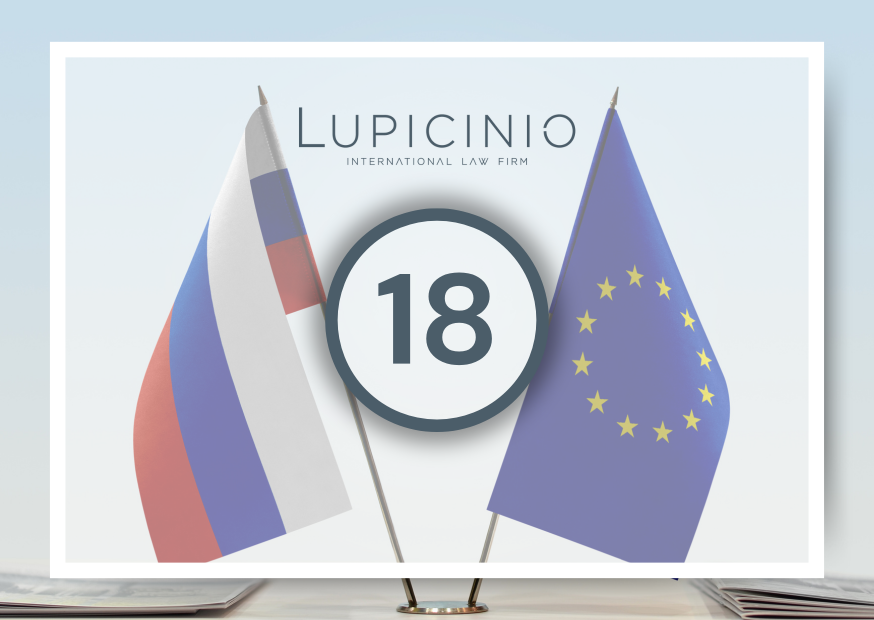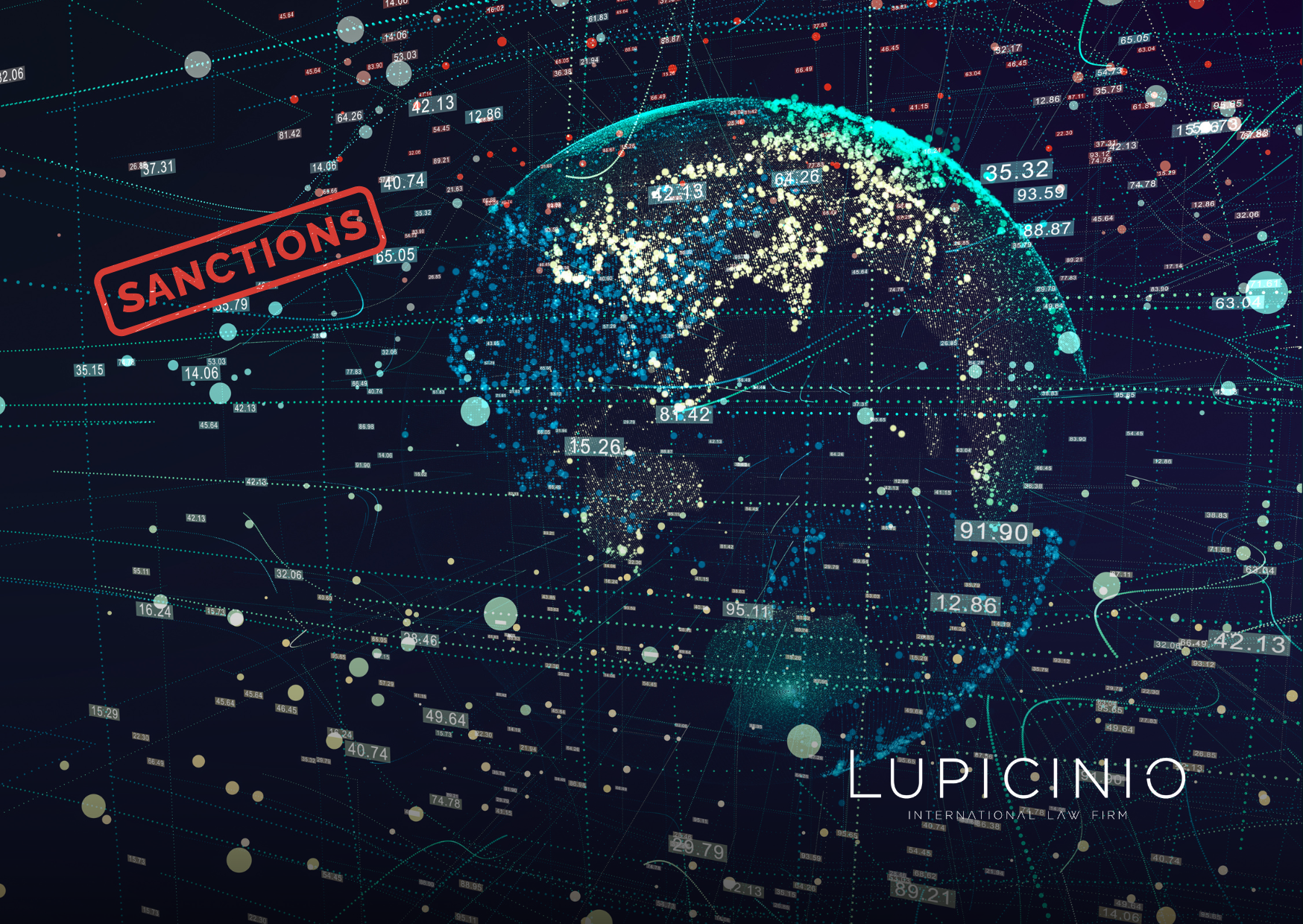On 18 July 2025, the Council of the European Union adopted the 18th package of sanctions due to the conflict between Russia and Ukraine. In particular, four Decisions and four Regulations were approved and published on the same day in the Official Journal of the European Union (OJEU).
These new restrictive measures, both economic and individual, are substantially aimed at the Russian energy, banking and military sectors, as well as trade with the European Union, thereby intensifying pressure on the Russian Federation.
Hereinafter follows a summary of the key provisions adopted under this sanctions package.
Tabla de contenidos
- Regarding Belarus’ participation in the conflict
- Additional restrictive measures against Belarus
- In relation to restrictive measures in response to Russia’s actions destabilising the situation in Ukraine
- Addition of fourteen natural persons and forty-one entities to the lists of persons subject to sanctions for actions that undermine or threaten the territorial integrity, sovereignty and independence of Ukraine
Regarding Belarus’ participation
in the conflict
On 18 July 2025, the Council of the European Union adopted Council Regulation (EU) 2025/1472, amending Regulation (EC) No 765/2006 concerning the implementation of restrictive measures in view of the situation in Belarus and Belarus’ participation in the Russian aggression against Ukraine, and Council Decision 2025/1471, amending Decision 2012/642/CFSP concerning the implementation of restrictive measures in view of the situation in Belarus and Belarus’ participation in the Russian aggression against Ukraine. The aim is to extend to the Belarusian regime the expansion of export and import bans on dual-use goods and technologies; the strengthening of asset freezing measures and restrictions on financial messaging services; the prohibition of the acquisition and transit of weapons and related material; the inclusion of new natural and legal persons in the list of those subject to sanctions; and the strengthening of the clause on the denial of enforcement of arbitral awards, court judgments and administrative decisions issued in third States in relation to European sanctions measures.
Specifically, a ban is introduced on the purchase, import or introduction into the EU, either directly or indirectly, products and technologies included in the EU Common Military List, whether they originate in Belarus or they are exported from that country, with very specific exemptions for contracts concluded before 20 July 2025 and for the supply of spare parts and maintenance services necessary for the safety of existing capabilities in the Union.
In addition, national authorities may choose to require prior authorisation for indirect exports of items listed in Annex V bis to third countries when there are reasonable grounds to suspect a risk of diversion to Belarus, thereby strengthening the prevention of avoidance of the restrictive measures.
The Regulation also extends the prohibition on providing specialised financial messaging services to new Belarusian credit institutions and their subsidiaries, while maintaining exceptions for diplomatic transactions, divestment operations, the winding up of activities and representations of the EU and its Member States on Belarusian territory.
Finally, the clause denying recognition and enforcement of abusive arbitral awards related to the measures adopted is strengthened, considering them contrary to the public policy of the Union, and the use of forum necessitatis is enabled so that injured parties can claim compensation for damages resulting from spurious arbitration proceedings brought outside the EU.
Additional restrictive measures against Belarus
On 18 July 2025, the Council of the European Union enacted Council Implementing Regulation (EU) 2025/1469, implementing Article 8a(1) of Regulation (EC) No 765/2006 concerning restrictive measures in view of the situation in Belarus and the involvement of Belarus in the Russian aggression against Ukraine and Council Implementing Decision (CFSP) 2025/1461 implementing Decision 2012/642/CFSP concerning restrictive measures in view of the situation in Belarus and the involvement of Belarus in the Russian aggression against Ukraine to strengthen sanctions against Belarus. The aim is to strengthen sanctions against Belarus for its complicity with Russia.
These measures add eight new Belarusian entities to Annex I of the Regulation, including state suppliers and companies in the military-industrial complex involved in the production of weapon systems, unmanned vehicles and optical components for weapons, such as: Belvneshpromservice (state defence exporter), OKB TSP (armament manufacturer), UAVHeli (military drones), Legmash Plant (ammunition) and other research and production centres linked to the Belarusian military complex, subjecting them to the freezing of funds and a ban on the provision of economic resources.
In relation to restrictive measures
in response to Russia’s actions destabilising
the situation in Ukraine
On 18 July 2025, the Council of the European Union adopted Council Regulation (EU) 2025/1494 amending Regulation (EU) No 833/2014 concerning restrictive measures in response to Russia’s actions destabilising the situation in Ukraine, and Council Decision 2025/1495 amending Decision 2014/512/CFSP concerning restrictive measures in response to Russia’s actions destabilising the situation in Ukraine.
This Regulation adds 26 new entities —including Russian state-owned companies, intermediaries in third countries and operators of the “clandestine fleet” of oil tankers— to the restriction’s regime, subjecting them to a ban on the export and re-export of dual-use goods and technologies (propulsion components, chemical precursors, industrial software), as they are entities that support the Russian military-industrial complex.
The list of products that could contribute to improving Russian industrial capabilities has also been expanded, and the list of products that cannot transit through Russia has been extended.
The temporary exemption for the Czech Republic for oil supplies via oil pipeline is also abolished and imports of refined petroleum products and LNG (liquefied natural gas) from Russian crude oil are drastically restricted, with very limited exceptions for energy security reasons.
With regard to the Nord Stream and Nord Stream 2 gas pipelines, any transaction related to them is prohibited, and a dynamic automatic procedure is established to modify the price cap on Russian crude oil based on the average market price of such oil.
To prevent the avoidance of these sanctions, the Regulation introduces an optional prior authorisation mechanism for all indirect re-exports via third countries when there is a clear risk of diversion to Russia, while clarifying the scope of the prohibitions applicable to subsidiaries of Russian companies and strengthening measures against the use of the SPFS system and other alternative financial messaging services.
Transactions directed to the Russian Direct Investment Fund are also prohibited and four entities are added to the list of entities in which the Fund has made significant investments.
Likewise, the prohibition on transactions referred to in Article 5a of Regulation (EU) No 833/2014 must be understood broadly and must cover all types of transactions, which in many cases may extend to European subsidiaries of a Russian parent company.
Additionally, 105 vessels have been added to the list of ships sanctioned for belonging to the Russian “ghost fleet”.
A ban on supplying computer software to the Russian banking and financial sector is established.
Furthermore, 22 new entities have been added to Annex IV of the Decision, mainly companies from the Russian military-industrial complex and indirect suppliers located in third countries, imposing stricter restrictions on the export of dual-use products and technologies —including high-precision CNC machinery, chemical precursors for booster engines and drones— that contribute to Russia’s capacity.
As with the sanctions against Belarus referred to above, judicial, arbitral and administrative decisions rendered in third States in the context of investor-to-State dispute settlement proceedings in relation to measures imposed by Regulation (EU) No 833/2014 or Regulation (EU) No 269/2014 will not be recognised or enforced in Member States as being contrary to public policy.
Addition of fourteen natural persons
and forty-one entities to the lists of persons subject to sanctions for actions that undermine or threaten the territorial integrity, sovereignty and independence of Ukraine
Finally, the Council of the European Union has adopted Council Implementing Regulation (EU) 2025/1476, implementing Regulation (EU) No 269/2014 concerning restrictive measures in respect of actions undermining or threatening the territorial integrity, sovereignty and independence of Ukraine, as well as Council Decision (CFSP) 2025/1478 amending Decision 2014/145/CFSP concerning restrictive measures against actions undermining or threatening the territorial integrity, sovereignty and independence of Ukraine. The common object of these acts is to strengthen the regime of individual sanctions against natural and legal persons of various nationalities who are directly or indirectly involved in the conflict.
Both acts amend the annexes to the preexisting legal instruments, adding a total of fourteen individuals and forty-one entities to the lists of persons subject to asset freezing, a ban on the provision of economic resources and a veto on entry into the EU. These are mainly natural and legal persons linked to the Russian military-industrial complex and the “clandestine fleet” transporting hydrocarbons, including senior executives of armament manufacturers, intermediaries in the export of dual-use machinery and oil tanker captains who facilitate the avoidance of restrictions.
By strengthening the sanctions regime, the EU seeks to increase the political and economic cost of these actors’ involvement, discourage the supply of military or dual-use equipment, and ensure that individual designations that have effective consequences in the international financial and commercial system.
******
Más información:
Lupicinio International Law Firm
C/ Villanueva 29
28001 Madrid
T: +34 91 436 00 90







